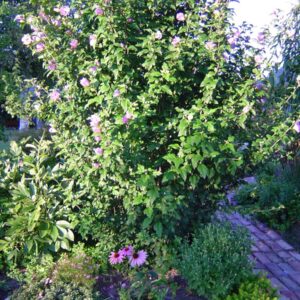Showing the single result
Wholesale Hibiscus, Rose of Sharon Bushes
Cold Stream Farm sells retail and wholesale Hibiscus bare root seedlings and transplants from our land in Free Soil, Michigan. We carry Rose of Sharon (Hibiscus syriacus) in limited availability, with orders best placed in spring.
About Rose of Sharon Bushes
A Rose of Sharon bush (Hibiscus syriacus) is also known as “shrub Althea.” Shrub Althea refers to a group of deciduous flowering bushes with blooms characteristic of the Hibiscus genus. Despite being nicknamed “Rose of Sharon,” these Hibiscus trees technically do not belong to the rose family.
How did Rose of Sharon Bushes get their nickname?
The first recorded use of the term “Rose of Sharon” is found in the King James Bible, after being translated from Hebrew in the Tanakh. In the Hebrew language, the name Sharon is said to mean “fertile plain” and the plant has also been translated to be called “the flower of the field.”
Today, there are many interpretations as to what species of flower is actually referenced in the Biblical “Rose of Sharon.” Many people believe that the text actually refers to a crocus, tulip, or lily. In modern context, Rose of Sharon bushes can be used to describe a number of different hibiscus bushes.
Look and Dimensions
Hibiscus bushes shoot upward with vertical branches topped by bright and colorful flowers. Rose of Sharon blooms in several hues including white, pink, lavender, violet, blue, and magenta. On average, mature Rose of Sharon bushes reach between 8 and 12 feet in height and 6 to 10 feet in width.
The leaves of a Rose of Sharon bush are deciduous, about 3 inches long. They are green, without any significant color change in the fall. Rose of Sharon flowers may bloom to be 4 inches in diameter. Although individual flowers are only open for a day or two, plant blooming time varies throughout the season and double blooms are common.
Best Conditions for Hibiscus Bushes
Hibiscus bushes survive in both full sun and partial shade, growing well in USDA Zones 5 through 9. The plants prefer hot weather and moist, well-drained soil. Rose of Sharon is very tolerant of pollution and works great in urban gardens.
Rose of Sharon is a very hardy plant, living and reproducing successfully through periods of neglect. Overly dry or muddy soil conditions are not suitable for Rose of Sharon, and the plants slightly favor rich, acidic beds.
Uses and Perks
With bright flowers blooming a variety of colors in the summer and fall, Rose of Sharon bushes are often used as ornamental plants. Hibiscus bushes are thick, propagate well, and are very prune tolerant, so Rose of Sharon is a common hedge or border shrub in climates where it can grow.
Rose of Sharon bushes also have several culinary and medicinal uses. The tree’s bark is filled with medically-active constituents that are used to treat a number of ailments including dysentery, diarrhea, and abdominal pain. Both Rose of Sharon leaves and flowers can be eaten raw or cooked, each with mild flavors. Try them in your next salad!
Interesting Facts about Rose of Sharon
- Rose of Sharon is native to Asia and found in the Middle East, Europe, and North America.
- The plant is mentioned in the South Korean national anthem and is the country’s official flower.
- Thomas Jefferson apparently grew Rose of Sharon at all three of his homes.
- The colorful and nutrient-rich flowers of a Rose of Sharon bush are very popular among butterflies, birds, and moths.
Cons and Challenges
As a hardy and attractive plant, there are not many challenges to maintaining Rose of Sharon if you live in a suitable location. Hibiscus plants may be difficult for gardeners to grow in Canada or northern regions of states like Montana, Maine, and Minnesota.
Rose of Sharon plants are also subject to potentially fatal diseases from slugs, fleas, and beetles. If the plant is under stressful conditions, bud drop may also occur.
How to Plant and Maintain Hibiscus Bushes
For best results, Rose of Sharon bushes constructed as a hedge border should be planted 2 to 3 feet apart from one another. Hibiscus plants reseed very successfully, so maintenance may be required to keep the plant from spreading beyond designated areas or property lines.
Be careful so as to not over-fertilize Rose of Sharon, as it could potentially damage the plant. Supplemental watering may be necessary to keep soil conditions moist and drained.
Compared to other plants, Rose of Sharon bushes are easy to take care of and require very little maintenance throughout their lifetime. If your space is restricted or you simply like the look of clean lines, annual pruning is recommended to maintain the shape of a Hibiscus hedge.
Order Rose of Sharon from Cold Stream Farm
There is no minimum order for retail or wholesale Rose of Sharon plants when shopping with Cold Stream Farm. Place your shipment online today or contact us to learn about immediate and future availability. We ship directly from our home in Free Soil, Michigan.


